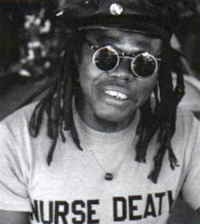My music is known as “ubongo beat”, because in Swahili “ubongo” means brain, and my songs are full of meaning.
(This article was first published in 2002 prior to the passing away of Remmy Ongala in 2010.)
Sivi (curriculum vitae)
Ramadhani Mtoro Ongala (Remmy) was born in the Congo (Kivu region) in 1947. Because he was born with his feet first, two upper milk teeth and full of dark hair, the traditional healer told his mother that Remmy could become a traditional healer himself in his future life. That is also the reason why he adopted the title “doctor” when he became a musician. The traditional healer also wanted Ongala´s mother never to cut the hair of Remmy and she followed that admonition. Only one time after his mother´s dead he cut his hair. After that he didn´t feel ashame of his locks any more (“When records by Bob Marley came out, I saw that he had hair like mine. So after that I felt allright. I became proud of my locks”).
Remmy was introduced to music as a young child through his father, who was a singer, sanza player and dancer. Unfortunately, he lost both his parents as a child. He dropped out of school by the age of 17, because he couild not longer afford to pay the school fee. After selling oranges and chewing gum in the streets, he joined a youth band called Bantu Success as a drummer and singer, leaving in 1966 because of family reasons. His passion for Franco´s guitar music encouraged him to teach himself to play the instrument. Two years later, he reentered music as a guitarist and played with several groups, including Success Mwachame, Mickey Jazz, and Uganda´s Grand Mika Jazz. Then he moved to Kenya and joined Orchestre Makassy, which also featured ex-OK Jazz guitarist Fan Fan. Ongala formed the first versiuon of Matimila in 1980 and by 1984 the band had assumed its current alignment of three guitars, sax, trumpet, bass and drums. In 1987 Orchestra Super Matamila consisted of eighteen musicians, but during one performance they are never more than six to eight musicians on stage. Due to the dearth of quality recording studios in Tanzania, they first simply rercorded their live performences. Unfortunately, beacuse of rampant piracy, Ongala never received the money he deserved for his songs.
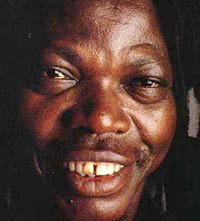
In 1988 the band toured Europe and North America, releasing their first international album for WOMAD. With following musicians of the Orchestre Super Matimila Remmy recorded the CD “Mambo” in 1992: Cosmas Thobias Chidumule (lead and backing vocals), Batii Osenga Ipopolipo (guitar and backing vocals), Ayas Ayas Hassani ( rhythm guitar), Shemboza Shekungu-Mkiva (rhythm guitar and backing vocals), Mussa Hamisi Magomba (bass guitar), Yusuph Iddi Subwa (drum).
Remmy Ongala remains the best-known musician based in Tanzania. Due to his high popularity even a bus stop in Dar Es Salaam is named after him “Kwa Remmy Sinza”. He is highly critical of other African musicians, whom he claims have compromised African music and who try to imitate the western style of music (“When an African imitates Michael Jackson, he can only be a village Michael Jackson. At the international level we can only be recognised for what is our own”).
Remmy´s aim is to make people dance, but also to make them think. He says he plays “heavy thinking music”, or ubongo, which in Swahili means “brain”. Remmy, who is called the voice of the Tanzanian, always has something politically astute or deeply philosophical to say. His concerns are rooted in both the daily life of Dar and politics on a global scale. By introducing English texts he widens his potential audience yet further.
Many of Remmy´s songs deal about poverty and death. He sympathises with the poor and oppressed people and calls himself “sura mbaya” (ugly face). Although he is not poor anymore, he says he will always be a humble person: “I will always be a humble person, even if my life [now] is not bad, I will go on to defend the weak ones…I lived in trouble, food was a problem, I picked up bread that others had thrown away. All the songs I sing result from the difficulties I had in the past…I speak out for my fellow brothers.”
Remmy lives in Dar Es Salaam with his English wife and four children.
habari (texts)
Remmy Ongala wants to educate his listeners by his songs. For the most part his songs are political and critical of society. Unfortunately, most of the highly valued word play and allusions get lost in the English translation. “Many musicians sing about love, about life. It´s always like that. And they don´t sing about something that´s going to make people [better], [about] what needs to be done to this world. So I try not to sing very much of love, [but] to try to illuminate the situation of the world.”
Ongala calls himself “sura mbaya” (ugly face) and is often described as the spokesman of the poor and oppressed. This can also be seen in some of his texts (see below his song “mnyonge hana haki” = the poor person has no rights):
| If you are on a journey never hurry… |
| There are many problems on the road, so don´t hurry… |
| I went on a journey, I arrived safely |
| I arrived peacefully |
| Peace |
| What bitter words |
| We all live in Dar Es Salaam everyone is on his/her own |
| In Dar Es Salaam we all live in rented homes |
| Why look into the affairs of your fellow |
| Brother if he has only eaten cassava leaves |
| I´ve got nothing to say, nothing to say |
| I´ve got nothing to say |
| Remmy is a weakling, Remmy-ugly-face |
| Remmy´s got nothing to say in front of his peers. |
| A bicycle has no say in front of a motorbike |
| A motorbike has no say in front of a car |
| A motorcar has no say in front of a train |
| The poor person has no rights. |
| I am poor, I have no right to speak |
| Poor and weak in front of the powerful |
| Weak as long as the powerful likes |
| A hare has no say in front of a lion |
| A rat does not promenade in front of the cat |
| The walking stick of the poor is paid by god |
| The poor have no rights… |
Another song which deals about the poor and unemployed is “Maiha” (life). Remmy tells his listeners that they should work – no matter what job they do – to be able to keep up with life:
| To live in this world without work |
| Is a burden to your kin |
| Nobody trusts you neither the young |
| Nor the grown-ups, nor the old |
| Life! Don´t blame yourself because others have got cars |
| Others have got houses |
| And you don´t |
| Life! |
| The world is the prison of everything in this world |
| Because the dilemma in this world is crime |
| The salary of crime is death |
| The salary of crime is death |
| The salary of crime: you will only die |
| You will only die |
| Life! |
| Work is work, don´t choose |
| Work is not to steal or to hurt |
| To be a fisherman is work |
| To be a shopowner is work |
| To repair shoes is work |
| To walk around with a pushcart is work |
| To sell groundnuts is work |
| To paint walls is work |
| To brush shoes is work |
| To sell coffee is work |
| To sell spinach is work |
| To wash carts is work |
| To be a turnboy in a bus is work |
| Everything that helps you to keep up with life |
| May be called work |
| Let us work hard |
| So that we can live well |
| Like our brothers |
| Life! |
| I´ve got a wife and children |
| I live in a rented home |
| How can I feed them? |
| Life is hard |
| Life! |
| My friends buy beer |
| I get drunk on chibuku |
| Don´t laugh at me |
| Life is hard |
| Life! |
One of Remmy´s first recorded songs is “Siku ya kufa” (the day you die). Also this is a very serious topic for Remmy it goes well with making the people happy and dance:
| My beloved brothers |
| This song is a song of remembrance |
| Of the day of birth and the day of death |
| “You have come from earth you will return to earth” |
| Thoughts, the thoughts of a grown up man |
| If he tells you something |
| Don´t joke… |
| The word of the old |
| If you argue |
| In the end you will be in trouble |
| To sing, we sing, listen to the ones who give advice… |
| Matters of importance |
| Don´t follow the luck of others |
| Every man has his own luck |
| Work and you will get |
| Ask for admittance and you will be let in |
| In this world of god |
| Look for it slowly and you will get |
| The rich have their wealth |
| The poor their children |
| The rich their car |
| The poor a pushcart… |
| The day of death, body of soil |
| All the beauty is spoilt |
| The youth has come to an end |
| But everything goes its way |
| The house you have built will stay behind |
| The children you have born will cry… |
| A corpse has no friends |
| My friends will run from me |
| In the past we ate together |
| Now they are afraid of me |
| Today I have become the devil |
His song “Asili ya muziki” (the roots of music) gives his listeners an impression of the ambiguous position of musicians, which are sometimes treated like champions and sometimes like outcats:
| Music shows its strength everywhere in the world |
| Even in church choirs sing to praise god |
| To praise the lord |
| Even at the government celebrations |
| Before the chairman starts his speech |
| It is music that draws peolpe´s attention |
| Musicians are not bandits |
| Or, if we are – why do you buy cassettes? |
| If we´re vagabonds – |
| Why do you request songs on the radio? |
| If we´re crooks – why do you buy records? |
| If we´re outcasts – why do you dance to music? |
“Mambo kwa soksi” (Matters of socks)is one of Ongala´s most popular songs. For about six months people wrote letters to the papers voicing their view about this song. Some MP´s even tried to ban it, but most were praising Remmy Ongala for his fight against AIDS:
| We “bad ones” strut proudly these days |
| Thinking we don´t have AIDS |
| Sister watch out, don´t die of AIDS |
| Your whole family can die |
| You can infect us |
| If a man seduces you, first ask him whether he has “socks” |
| If not buy them for him |
| “Where do you get them”? |
| “In any hospital” |
| “It would be better if they were sold in bars and guesthouses” |
| “No, they should not be sold at all: when you buy |
| A bootle of beer, you get one free as a present |
| When you sleep in a guesthouse, you get a towel, |
| soap and spare socks.” |
A quiet critical song against corruption is called “Mrema”. Mrema – the Minister of Home Affairs – is, however, a politician greatly respected:
| Mrema |
| The drum is calling |
| To advertise the war on corruption |
| Black marketeers, profiteers and laziness |
| And those who sabotage the nation |
| Mrema is here |
| Some are complaining, saying he´s gone too far |
| Inside the country Mrema is here |
| He is looking everywhere for those who are corrupt |
| He´s searching around every corner |
| He wants to know who is the thief |
| Who is killing elephants? |
| Whis is selling rhino horns? |
| He wants to know who the gansters are. |
In his song “Lolango” Remmy talks about the reason, why he became a musician: his inner urge to sing and following the tradition of his father and grandfather:
| Lolango,Lolango |
| I will sing! I will sing! Some people ask me why I sing? |
| What is my work? My work is to sing! |
| I live so I can sing, I eat because I sing |
| Everything in life is because I sing |
| I have married because I sing |
| The children I begot so I can sing |
| I will sing! I will sing! I will not stop to sing |
| Until the day I die, Lolango, Lolango |
| I will sing! To sing for me ist to sing for my family/ancestry: |
| My father was singing while he fathered me |
| And me, I go on singing |
| I will sing so I can feed my children |
| To sing is work like any other |
| I will go on with this work until the day I die |
| I am known a little because of my singing |
| When Remmy passes on the road the children always follow him |
| When Remmy speaks, people will close their ears |
| When Remmy laughs all the people complain, they don´t like it |
| I will sing! |
| There are people who ask me what work I do |
| I live so I can sing |
| Everything in life is because/ so I can sing…? |
The town migration in Tanzania increases. But without their shambas (fields) many of the migrated people get poor anmd hungry. With his song “pesa” (money) Remmy wants to make the people think more critical about town migration:
| Give me money, |
| so I can be like you |
| Oh money, why do you throw us into so many difficulties |
| Oh money, oh money! |
| I cry for money |
| Give me money |
| So I can be like you |
| I cry for money |
| Money is important for the daily necessities of man |
| Wherever you go, whithout money you will not get far |
| If you´ve got money, you will get to any place you want to go |
| If you lack money, if you ask someone for it, |
| He will give you good advice |
| Banknotes, money… |
| Money, who is your father? |
| Money if you were natural we could ask you |
| Why some have it and others don´t |
| You ask me why my neighbour has a house and I don´t |
| I it because of money |
| If you are seen with money your friends follow you |
| If you don´t have money they despise you |
| I tell you: money |
| I cry for money |
| Give me money. |
| We inhabitants of Dar Es Salaam don´t have our shamba |
| Our shamba is money |
| If you lack money, you will sleep hungrily |
| If you miss money, you are despised |
| If you want to earn money don´t be ashamed |
| If you sell tomatoes you will get money |
| If you sell groundnuts you will get money |
| If you sell spinach you will get money |
| If you sell coconuts you will get money |
| You will get nothing without hard work |
| And also, you will not get anything without farming |
| You are caught by money, everything depends on money. |
“Narudi Nyumbani” (I am going back home) shows also the differences between modern life in town and traditional life in the rural areas. Remmy is singing about leaving the town and going back home to farm and “reunite with the old”:
| I am going back home |
| Town is too much for me to bear |
| Dar Es Salaam is not amusing |
| I am going back to the village |
| To carry out the order of “work-hard” |
| I am going to reunite with the old |
| Eh, I am going back home |
| I have decided to return home |
| Home is home |
| Whether it is a good or a bad place |
| Your home is home |
| Where your father stays is your home |
| Your mother is the mother |
| I have decided to return home |
| I am going back to Songea |
| I am going to farm maize… |
| I am going back with songs |
| I am going back to Matimila |
| Oh, I am going back home |
| Life in Dar Es Salaam is not a past-time |
| I am going to the village |
| To follow the call of “hard-work” |
| I am going back to “Maji Maji” |
| Oh, I am going back home |
| To return to Songea… |
In his song “Dunia” (world) Remmy is singing about his idea of heaven to tell the people that everything that counts is life on earth. After ascertaining that all problems in the world are man-made, he calls all Africans to love and listen to each other:
| For badness you will pay here on earth |
| In heaven there is darkness |
| In heaven we will not see each other |
| In heaven there is no father |
| In heaven there is no mother |
| In heaven there is no rich man |
| In heaven there is no education |
| In heaven there is no status |
| In heaven life is peaceful |
| In heaven we will not know this world |
| Brothers, this world |
| The lesson we will learn in this world |
| It is not the world that is bad |
| It´s inhabitants are the bad ones |
| It is the people who don´t listen to each other |
| It is the people who don´t like each other |
| The earth´s inhabitants don´t show any goodness. |
| Oh Africa |
| In Africa let us love each other |
| In Africa let us listen to each other |
| My Africa |
| Africa of our grandfathers |
| Africa, Africa, Africa,… |
Another topic that appears in some of Remmy´s songs is the status and treatment of women in the East African society. He calls all people to give more respect to women by his song “Pongezi kwa mama” (compliments on mothers):
| I would like to give compliments to all mothers |
| Let us give all mothers the respect they deserve |
| A woman, even if she is young, once she gets married by your father |
| You call her mother |
| If she gives birth to a child |
| You call him/her brother/sister |
| Let us give our sisters, all women their due respect |
| We all have come out of their wombs |
| Let us treat them with great respect everyone on earth. |
rekodi (discography)
Remmy Ongala, Songs for the Poor Man
(Real World, 1989)
Nasikitika
Karola
Kipenda roho
Sauti ya mnyonge
Kito
Usingizi
Muziki asili yake wapi
Pamella
Dole
Mariam wangu
Remmy Ongala, Super Matimila Mambo
(Real World, 1992)
Dodoma
One world
I want to go home
Inchi vetu (our country)
What can I say? (Niseme nini?)
No money, no life
Living together (tupendane)
Mrema
Kidogo kidogo (little by little)
Remmy Ongala, The Kershaw Sessions
(Strange Roots, 1994
Nasikitika
Nifanyanini
Dole
Usingizi
Narudi Nyumbani
Bwana mdogo
Niseme nini
Tupendane
Kilio
Waseme waseme
Maisha
Amisa
Remmy Ongala, Super Matimila Sema
(WOMAD Select, 1995)
Penzi Lauwa
Mwanza
Waseme waseme
Kilio (The fish song)
Tamwiki
Fadhili ni utumwa
Mwungo (Naloba)
Players
Lombamba
Nalia mwana
Libala
Remmy, Ongala, Super Matimila On stage with Remmy Ongala
(AHADI)
fasihi (literature)
- Bender, Wolfgang; 2000: Sweet Mother. Wuppertal: Peter Hammer Verlag.
- Ewens, Graeme; 1991: Africa Oye. London: Guiness Publishing.
- Graebner, Werner; 1989: Whose music? The songs of Remmy Ongala and Orchestra Super Matimila. In : Popular Music, 8/3, 1989.
- Graham, Ronnie (Pub.); 1992: The World of African Music. Stern´s Guide to Contemporary African Music, Volume 2. London: Pluto Press.
- Hanga, Sylvester; 1996: Remmy Ongala´s Fight to Become a Tanzanian Ctitizen. In: The East African, September 23-29, 1996.
- Ngotho, Kamau; 1990: Super Bad Sura Mbaya. In: Kenya Times, November 20, 1990.
- Steward, Gary; 1990: Remmy Ongala: Ubongo Man has come. In: The Beat, 9/2, 1990.
Super Bad Sura Mbaya
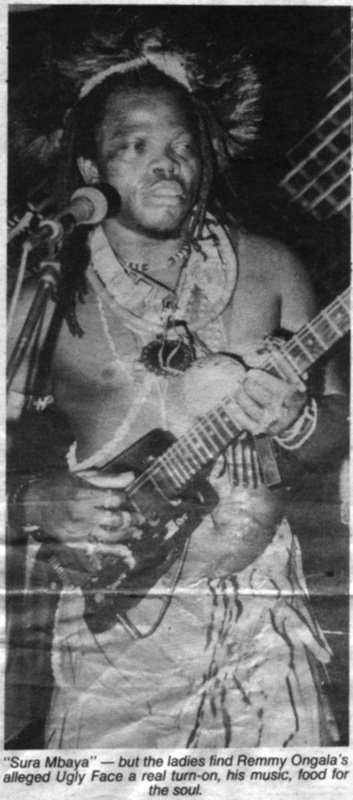
Times KAMAU NGOTHO meets an East African music genius
WITH his “Bongo” beat and hypnotic “Soukous” melody, top flight maestro Remmy Ongala – “Sura Mbaya” to his many fans – sets the stage aflame with his heart-rendering lyrics.
Backing up the magic show is the Dar es Salaam-based nine-man Super Matimila Band currently an a monthlong tour of Kenya. Attired in traditional regalia and sporting dreadlocks,”the musician no woman would like to look at twice” conjures up sounds from the lead guitar and slowly takes the mesmerised audience through the motions of his soul-searching number: Kifo… Kifo, Kifo hakina huruma…
“His son s have an irresistable difficult-to-define ”something”,” says a captivated fan. “Remmy has a message and knows how to sing it,” another fan explains. From the lemon of his bitter past, the Zairean-born musician has squeezed out a sweet lemonade of lyrics that inspires his fans into flight of meditation whenever he takes to the microphone.
“If at all Im successful it is because I compose songs an serious topics. There is always a message to pass in my lyrics,” says the music wizard who has been christened “Daktari” (doctor) for his clinical analysis of close-to-the-heart issues.
Dodging a dog”s life that saw him eat from the dustbin and drop from school early, Remmy has survived the odds to sparkle in the galaxy of Africa”s leading musicians. “I”ve come a long way indeed. Food was a problem, shelter a shack,” he recalls of his hard past. But despite having crossed the social bridge, the deprivations of his yesteryears still haunt and inspire this top music man.”The difficult past is my driving force. I like to speak for the suffering, to sing for the down-trodden.”
The indellible tragedy of losing his father at age 7 and his mother at age 14 was what inspired his smash hits, Kifo – a lyrical post-mortem of what Shakespeare called a “bourne from which no visitor returns”. “Death you took my wife. My child cries everyday, where is mother… but I can”t find the words because of you, Death. Death you have no mercy,” he sings of the humanity”s most dreaded nemesis.
The successful musician is the one who draws his inspiration from his people, his environment and his past, emphasises Remmy adding:” Musicians are the prophets of their respective societies.” Such were also the Sentiments the Tanzanian music genius expressed in his hit, Muziki asili yake wapi Posed he: “Music where do you hold your secret? Music, who are you for?” In another stanza, Remmy answers the question: “Music is a calling … Music is a teaching Music has power.”
From a scrap box-guitar he picked from a garbage heap at age of 15, Remmy has made a trail-brazing career that started with a village heart-throb group, the “Success Bantu Band” in the ”60s. He then went an to the famous L”Orchestre Makassy of the ”70s and now the internationally renown Super Matimila Band.
***
lt was in 1964 that Remmy and six other village boys took their village in Songea, Tanzania, by storm with their music as the “Success Bantu Band.” Twenty-five years later, the same spark was sputtering red hot to ignite music auditoriums in London, Paris, Bonn, Copenhagen, The Hague and Rome where Super Matimila were an a two month-promotional tour.
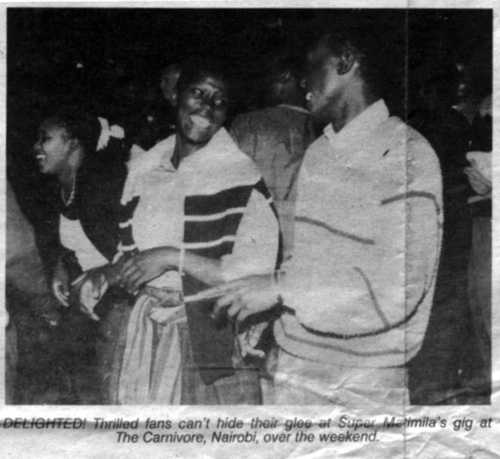
US Itinerary
And early next year the music wizard hops to the United States for a fouryear long music itinerary at the request of Uncle Sam”s African melody lovers. “The whites like my music because it is original and down to earth,” says Remmy who last year was among the top five African musicians picked to represent the continent at a pretigious World Music Concert in London. Others in the exclusive”top-five list were Tabu Ley, the Tate Franco, Yousou N”Dor and Keita. “The organisers found something distinctively African in our music and invited us at the global concert,” says Remmy. “The most annoying habit by African musicians is to ape foreigners. That way our rich and obvious talent is condemned to oblivion,” he laments. “When an African imitates Michael Jackson, he can only be a village Michael Jackson. Otherwise at the international level we can only be recognised for what is our own.” A tourist at Carnivore”s Simba Saloon where Remmy entertained fans last Friday could not help commenting before grooving to the rythm: “His music and style has the real African touch.”
English wife
For Remmy, converting the odds in life to a plus is a natural habit. Nicknamed “Sura Mbaya” (Ugly Face) for his alleged striking “ugliness”, Remmty is nevetheless a ladys heart-killer. “I readily accept to be called Ugly Face and even make fun of it; something which wins the hearts of many.” His dark and rough-looking skin has not, however, been a road-block to beauties. “Ladies make my best company,” he confesses.
A stage show in Paris 11 years ago caught the love nerves of one Englishwoman, Rosemary, who found the charms of the black maestro irressistable, married him and came to Africa. Rosemary Ongala, now a mother of four, is a school-teacher at a Dar-es-Salaam school. She is lovely and my life”s pride,” Remmy says of his English better-half” She and our four children make me bargain for more and more of the best life has to offer.” And is Remmy”s wife ever concerned about the many pretty lady”s hobnobbing around her husband? “Never. She understands it as the price to pay for a husband who is famous. All the same, her place in my heart remains the same as when we first began”.
For his children, Remmy is a father whose career is cause for today”s hapiness and the dream of tomorrow. “My three elder children take a keen interest in music. “Mama and I are giving them all encouragement.”
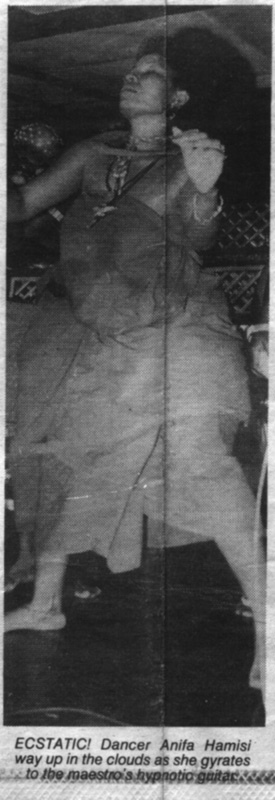
The music wizard who sings of home in Songea was born to a Tanzanian mother and a Zairean father at Kisangani in Zaire 43 years ago. A prisoner of traditional superstitions, Remmy”s mother had ran away from her home and husband in Songea an a witchdoctor”s advice that only a “distant” man would fulfill her dream of suckling a child after her matrimonial husband had persitently let her down. In Zaire, Remmy”s mother promptly “hooked”., herself a man with whom she conceived Ramazan (long of Remmy) Ongala and nicknamed him “Mturo” (the one who ran away) as per her witchdoctor”s instructions. “Such is the uniqueness of_my Background,” says the musician who claims to have been born with two upper milk teeth in their place and head fumlill of dark hair. But tragedy followed Remmy”s mother to her country of adoption taking away her husband in 1954. Away fron her own people and rejected by her dead “husband”s” kins, Remmy”s mother and her only son succumbed to untold poverty before finally giving in to illness in 1961 to leave behind an orphanned Remmy.
Orphaned boy
But the head-aches of destitution were never strong enough to derail the ambitions of the young boy. At about the Same time the news of Remmy”s mother”s death got home in Songea and an aunt was sent to take back home the orphaned boy. Fired by Franco”s guitar wizardry and Tabu Ley”s ear-charming lyrics, the grandson of a traditional dancer picked a discarded box guitar and took his bist lessons in music from a friend.
One bar owner noted the potential in Remmy and six other village boys whom he employed to entertain revellers as they took their evening swallows. The seven-boy squad later becaue the “Success Bantu” band.
By 1969 the fledgling music chick was ready to leave the nest. Remmy quit the Success Bantu and formed his own Super Mwachane Band and followed it with a promotional tour of Zaire and Tanzania. At last the poor boy of Songea had arrived! His uncle, Makassy of the famous L”Orchestre Makassy, realised the asset in his young nephew and embraced him into his fold in the ”70s. With L”Orchestre Makassy Remmy released among others, Siku ya Kufa, Nyanui ya Udongo and Arusi Mwanza. The music marriage with his uncle hit the rocks in the Tate ”70s and Remmy joined Super Matimila as Makassy settled in Europe.
And early this year Remmy”s Matimila teamed up with the King of Bongo beat music Cosmas Tobias Chidumule of the Milimani Super Orchestra fame to make up the music wonder that is now the Super-Matimila band.
In the new combination the band has produced, among other “special-effects” hits, Kifo, Sauti ya Mnyonge. Karola, Kipenda Anifa Hamisi; Roho and Usingizi. If music be the food of the soul, with Remmy an the stage there is no way any audience will be disappointed.

